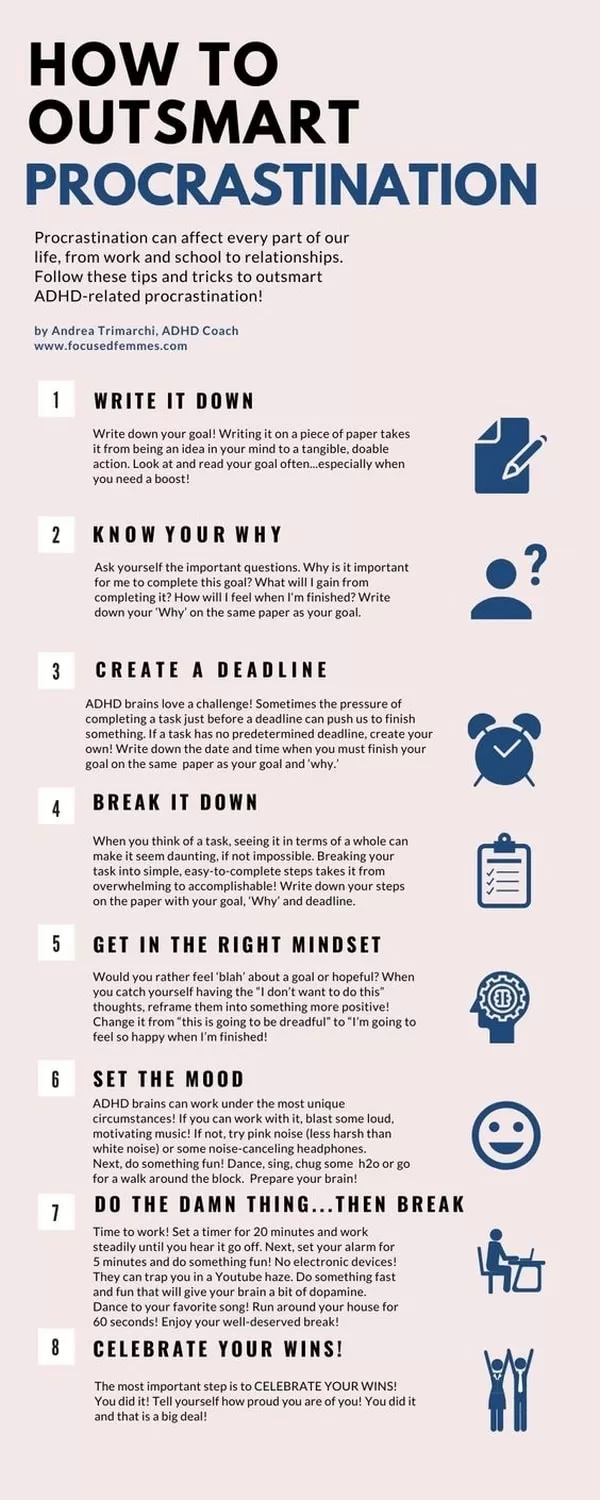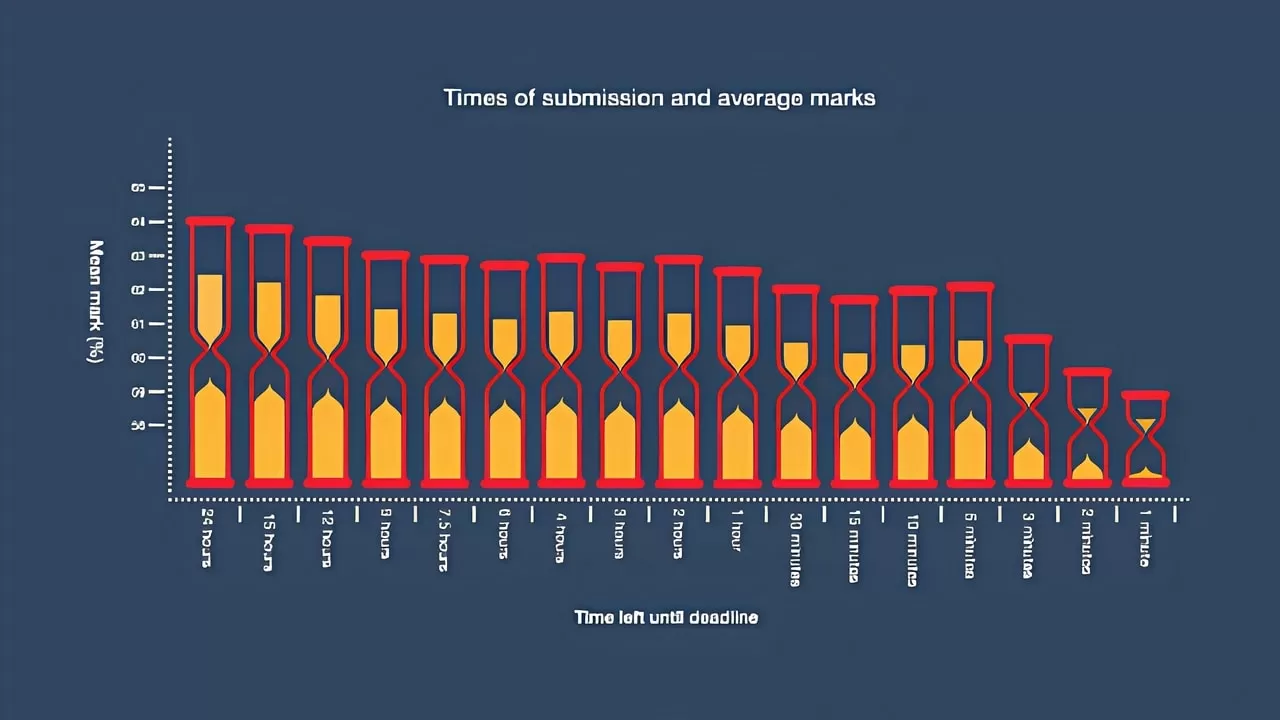Today's Monday • 14 mins read
— By Dr. Sandip Roy.
You must get this one thing first: procrastinators are not lazy people.
Procrastinators are unhappy people. They believe they have to outsmart time. But why do procrastinators procrastinate?
For a minute, forget people who seem to procrastinate all the time. Think of the times you and I procrastinate at times? Is it because we can’t seem to manage our time, or is it really because we can’t seem to manage our emotions?
Procrastinators have a complicated relationship with time and often believe the time is up against them, and they have to outsmart it somehow.
But even then, procrastination is not just a matter of time management. Rather, it is a complex psychological/emotional problem with deep roots in self-esteem issues.
Procrastination can be defined as the deliberate avoidance of taking action.
The ten main psychological reasons a procrastinator tends to procrastinate are:
1. The Task Brings Up Negative Feelings
“Procrastination is not a time-management problem, it’s an … emotion-focused coping strategy to deal with negative emotions.”
—TIMOTHY PYCHYL, AUTHOR OF SOLVING THE PROCRASTINATION PUZZLE
You might find yourself putting off tasks because they stir up negative emotions in you.
Maybe the task is just dull, stressful, or downright annoying, making you feel bad or bored. Often, this emotional struggle is the main reason you procrastinate.
So what do you do instead? You find other activities that are more enjoyable but ultimately pointless and avoidable, pushing the important task to the back burner. Why? Because these distractions offer instant gratification.
You delay tasks that you find boring, stressful, or joy-killing until you can’t put them off any longer. This is what scientists refer to as “task aversiveness.”
This behavior stems from what psychologists call the Pain-Pleasure Principle. It’s human nature to avoid activities that cause discomfort and seek out those that bring immediate pleasure.
2. You Think You Can Do It Later
Often, the reason you procrastinate is that you feel the time limit to finish the work is more than sufficient. You think, “I can always do it later.”
You believe you don’t need all that time to complete the project. So, you keep putting it off until the last minute.
You might also engage in unrelated activities to delay starting the task. You tell yourself that you’re actually preparing for the work at hand.
Instead of diving into the task, you could spend the allotted time gathering unnecessary data. You might even find yourself scrolling through your Twitter or Facebook feed under the guise of “research.”
“The procrastinator believes tomorrows come in unlimited supply. And one of those tomorrows will be better, and that day, the sun will shine brighter.”
3. You Lack Adequate Confidence
You might procrastinate because you feel inadequate for the responsibility you’ve been given. This lack of confidence in your abilities often stops you from starting an assignment.
Before falling into the procrastination trap, you may have grappled with feelings of uncertainty for a long time. Maybe you doubted your ability to handle tasks effectively.
Experts suggest that this issue of low self-esteem could be a significant reason for your procrastination.
- Studies like the one by Batool & Khursheed, 2017, found a link between self-esteem, self-efficacy, and procrastination.
- Nader Hajloo’s 2014 study also found that procrastination was related to self-esteem and self-efficacy among undergraduate psychology students.
Another related issue is that, as a procrastinator, you might feel shy in asking for help.
While at it, did you know that anyone may overcome their low self-esteem with mindfulness?
4. You Have A Streak Of Perfectionism
Procrastinators are also frequently reputed to be perfectionists.
As a procrastinator, you won’t say you’ve completed your task until you’ve found the perfect solution for the work assigned to you.
Perfectionists like you often end up procrastinating. Some experts think that procrastination is a masked-up perfectionism.
In specific fields like medical research, competitive sports, and classical music, perfectionism is typically the default requirement. But for most people, this becomes a handicap that leads to unnecessary delays in finishing tasks.
So, one way to overcome procrastination is to slightly lower your standards and step away from your task as soon as it is good enough, without waiting for it to be perfect.
5. You Have A Fear of Both Failure And Success
Occasionally, you might find yourself avoiding tasks due to a dual fear: the fear of failure and the fear of success.
The fear of failure is a common psychological hurdle; it’s the apprehension that your efforts will not only go unnoticed, but could also negatively impact your social reputation.
This fear often stems from a low frustration tolerance, a concept well-documented in procrastination research, which makes the prospect of failure intolerable.
On the flip side, the fear of success is a more nuanced issue.
Fear of success is rooted in the concern that completing a task efficiently may set a new standard for you, leading to more challenging and demanding responsibilities in the future.
This is what experts in the field refer to as “success syndrome,” a paradoxical situation that refers to the positive and negative outcomes of achieving a goal or victory.
- When successful, you get rewarded with material wealth, fame, prestige, power, control, and influence.
- However, a successful person is also burdened by ever-increasing expectations.

6. You May Have An Impulsive Nature
You might find yourself frequently jumping between tasks, unable to stick to one for a long time. This is a hallmark of impulsivity, a trait often linked to procrastination.
Being impulsive makes it challenging to manage your goals effectively, leading to a cycle of unfinished tasks.
Interestingly, some experts in procrastination psychology argue that impulsivity and procrastination are two sides of the same coin, even though they appear to be contradictory. This is the “Impulsivity-Procrastination Paradox.”
Understanding this paradox can offer a fresh perspective on why you procrastinate and how to manage it better.
Procrastination is often seen in neurodivergent people, like those with Attention-Deficit Hyperactivity Disorder (ADHD).

7. You Have Anxiety
You might notice that when a deadline looms closer, your anxiety spikes, and you start procrastinating even more. This isn’t a coincidence; it’s your anxiety pushing you to avoid the task at hand.
In this heightened state of anxiety, you might find yourself doing anything but the project that’s causing the stress.
Suddenly, cleaning your desk becomes an urgent task, and your car seems to need immediate servicing.
This is a classic avoidance behavior, a psychological mechanism to dodge the perceived threat, which in this case, is the impending deadline.
Jacobson & Newman found that anxiety predicted later depression, and this relationship between anxiety and depression was mediated by avoidance.
Understanding this link between anxiety and procrastination can be a game-changer. It allows you to address the root cause of your procrastination, which is often the anxiety itself, and not just the task you’re avoiding.
8. You Have Goal Problems
When your goals are vague, too far in the future, or even non-existent, procrastination becomes your default mode.
This lack of clarity or immediacy in your goals and objectives can make it difficult to take concrete steps toward achieving them.
Learning the art of effective goal-setting can be of great help in such a case. By setting clear, achievable, and time-bound goals, you give yourself a roadmap that guides your actions, making it easier to start tasks and see them through to completion.
So, it’s not just about attacking the task at hand, but rather about setting up well-defined goals to align with your actions. This can serve as a powerful motivator, driving you to act rather than delay.
9. You May have Inherited It
A study involving 347 twins from Colorado suggests that procrastination could be 46% heritable.
This means there’s nearly a 50-50 chance you might have inherited this tendency from your parents.
However, note that this is only half the story. The other half is shaped by your environment and experiences.
So while genetics might predispose you to procrastinate, your habits, mindset, and surroundings play an equally significant role in whether or not you actually do.
So yes, you might have a genetic predisposition, but you also have the ability to shape your behavior through conscious choices and environmental changes.
10. It Could Be A Mental Illness
Procrastination can be a symptom of an underlying serious psychological condition.
These include borderline personality disorder (BPD), depression, anxiety, exhaustion, and chronic fatigue syndrome (CFS), and addiction issues. It’s also prevalent in strained relationships.
Knowing this changes the way we see procrastination – from merely a “lack of willpower” to a potential sign of something severe going on undiagnosed.
If you find that procrastination is severely affecting your life, it might be worth exploring these underlying issues with a qualified psychology professional.
What Is Procrastination
Procrastination is deliberately delaying action, despite the procrastinator knowing they will eventually be worse off because of that delay.
- It is avoiding starting something you mean to start.
- It is avoiding finishing something you’re supposed to finish.
- It is doing something else, or lots of something else, when you know you should be doing a certain important thing.
10 Psychological Reasons For Procrastination
- Poor time management skills and work habits.
- Irrational thoughts and unrealistic expectations.
- Anxiety & Emotional State: Anxiety linked to performance and outcomes.
- Strategic Planning: Inability to develop efficient problem-solving approaches.
- Personal Characteristics: Responsibility, perfectionism, neurotic tendencies, etc.
- Focus and Clarity: Inability to concentrate and inadequate problem-solving skills.
- Self-Perception: Self-efficacy (SEF) beliefs, self-esteem issues, and low self-respect.
- Achievement Orientation: Inability to align personal goals with actions for success.
- Resilience & Adaptability: Overwhelming fear of new situations and embracing challenges.
- Task Approach: Discomfort regarding tasks, fear of failure, and inability to orient goals of success.
Hope can be a good coping strategy for procrastinators (Alexander, 2007).
2 Types Of Procrastination, As Per Psychology
The psychology experts classify procrastination into two types –
- Decisional — putting off making decisions
- Avoidant — putting off doing things
All of us procrastinate at some of the times in both these ways – some do it more, others do it less.
But the truth is, none of us do it all the time. Even the worst of the procrastinators doesn’t prefix a delay to all of their activities.
3 Areas Of Procrastination
The 3 key areas of our life we procrastinate on are education, career, and health.
1. Education
Procrastination is quite pervasive in the education field. For many of us, this problem traces back to our earliest school years, when we were perhaps slow learners and were labeled by our peers and teachers. And we carry the label long after school.
2. Career
Most of us know someone who really doesn’t like their job and wants to move on, but they can’t. Like a fish swimming around in a bowl and wanting to jump, but never doing it. That “fish” is often us.
3. Health
We are terrible procrastinators when it comes to our health issues.
- Think of the New Year’s Day health goals you set for yourself and kept delaying starting out on them, year after year.
- Think of that regular half-hour yoga that never came around, or those 8 glasses of water, or those 8 hours of sleep that could never become a reality.
- That smoking habit that a person you know left and then picked up so many times that they feel ashamed to even whisper about quitting.
How Much Of Youth Procrastinates: What This Study Found
Professors David Arnott and Scott Dacko from Warwick Business School studied late assignment submissions (Leaving Essays To The Last Minute).
They found that 86% of their 777 marketing students procrastinated until the last day to submit their work. While this high percentage might not shock many, the real surprise came in the last 24 hours.
Analyzing the data, the professors discovered a troubling trend: grades declined with each passing hour. Students who submitted at 3 p.m. scored lower than those who submitted at 2 p.m.

This pattern was so consistent that last-minute submitters saw a 5% grade drop compared to those who submitted earlier.
For students, this 5% could mean the difference between a ‘B’ and a ‘C+’, making the case against procrastination even stronger.
The Cycle of Procrastination & Unhappiness
While procrastination is not a mental illness, it’s often linked to stress, worry, and guilt, impacting mental well-being.
Most procrastinators go through this cycle – hope, anxiety, guilt, self-criticism, and ultimately, regret.
The main issue is the management of negative emotions tied to tasks, leading to procrastination. Studies confirm this.
The Procrastination Research Group found that 94% of over 10,000 respondents said that procrastination negatively affected their happiness. Another study showed nearly 70% of procrastinators were less happy than average.
Chronic procrastination can tarnish your reputation and strain relationships. Procrastinators often lie to justify delays, but when caught, the consequences can be severe, further reducing happiness.
It is a story that goes around in a predictable circle:
Procrastinators begin with hope, then go into anxiety, guilt, and self-criticism, and end up in regret.
Next project: Same cycle.
Procrastination Is Not Laziness
Laziness is not doing a task because you would rather not put in the effort, or because you barely feel like doing it.
Procrastination is NOT laziness. Those who procrastinate don’t do a task because they would rather not do it now. Note that ‘now.’
Lazy people do not have any time to do a given task – neither now, nor later.
Procrastinators are a different breed – they want to do a task, but NOT NOW.

How To Stop Your Procrastinating
Here are three evidence-based strategies to overcome procrastination:
1. Time Blocking
One of the most effective ways to tackle procrastination is to allocate specific blocks of time to tasks. Instead of saying, “I’ll work on this project today,” say, “I’ll work on this project from 10 a.m. to 12 p.m.” This creates a sense of urgency and makes the task more manageable.
2. Pomodoro Technique
This involves breaking your work into intervals, traditionally 25 minutes, separated by short breaks. This technique leverages the psychological principle that limiting work periods makes tasks less intimidating, thereby reducing the urge to procrastinate.
3. “If-Then” Plans
The “If-Then” planning strategy is rooted in cognitive psychology and aims to create an automatic response to a specific trigger, thereby bypassing the need for willpower or conscious decision-making.
Here’s how it works in more detail:
- Identify Triggers: First, recognize the situations or emotional states that usually lead you to procrastinate. It could be something like feeling overwhelmed, or specific distractions like checking your email or social media.
- Specify Your Response: Decide what action you’ll take when the trigger occurs. The action should be specific, achievable, and beneficial in steering you back to productivity. For example, “If I feel overwhelmed, then I will take a five-minute walk to clear my head before tackling the task.”
- Repeat: The key to making “If-Then” plans effective is repetition. The more you execute the plan, the more automatic the behavior becomes. Over time, you’ll find that the ‘Then’ part of the equation kicks in almost reflexively when the ‘If’ condition is met.
- Review and Tweak: Periodically review how well your “If-Then” plans are working. If they’re not as effective as you’d like, consider tweaking either the trigger identification or the specified response.
So, basically, you create contingency plans for when procrastination triggers arise.
Final Words
And finally, chasing happiness too hard can actually reduce your chance of finding it. So, stop chasing happiness, and instead, AIM for lifetime happiness.
The saying “good things come to those who wait” doesn’t apply to procrastinators. However, a growth mindset can change things positively for procrastinators
A growth mindset means the belief that your skills can improve through focus and hard work. It gives you a love for learning despite obstacles, making it easier to achieve your goals even when things get tough.
[An earlier version of this post originally appeared on Lifehack.org, written by the same author.]
√ Also Read: Stop & Overcome Your Procrastination: Hacks That Work
√ Please share it with someone if you found this helpful.